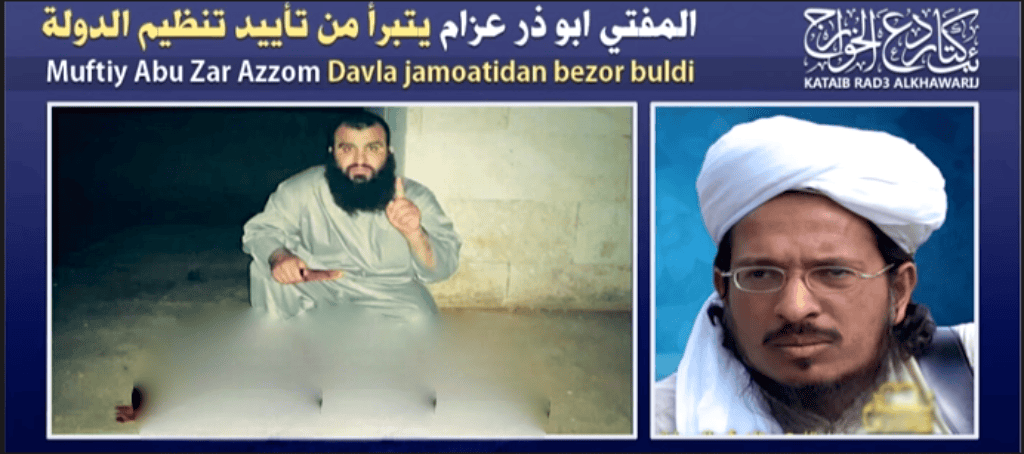
An influential jihadist who served as the mufti, or top religious figure, for the Islamic Movement of Uzbekistan and who defected to the Islamic State’s Khorasan province has denounced his new group and apologized for remaining silent on its misdeeds in the region. The defection is the latest blow to a weakening Islamic State, which is losing ground in Iraq, Syria, and Libya, and is struggling to maintain a foothold in Afghanistan and Pakistan.
Abu Dher al Barmi, the Islamic Movement of Uzbekistan (IMU) mufti who is also known as Abu Dher Azzam, disavowed the Islamic State in an Uzbek-language file uploaded onto YouTube by “a media group opposed to the Islamic State,” according to the SITE Intelligence Group, which translated the audio. Al Barmi had previously been featured in IMU propaganda.
Al Barmi said that he joined the Islamic State in 2014 as he was “among those who were influenced” after Abu Bakr al Baghdadi declared the establishment of the caliphate. However, he quickly soured on the Islamic State.
“But after a year, I learned of many evil deeds within this group, such their killing the Muslims on charges that lack evidence, and their issuing of fatwas against those who did not join their group,” Al Barmi stated. “After their fatwa was issued in Khorasan in which they infidel-branded the Taliban, who have waged jihad for nearly 40 years against the Russians, the Americans, and their agents, it pained my heart!”
After denouncing the Islamic State, al Barmi apologized for remaining silent.
“My first mistake was endorsing them, and the second mistake was delaying in informing the Ummah about the truth!” he said.
He also appealed to “our brothers who came from Central Asia” to reject the Islamic State and to not use his previous declaration of support as a “pretense” to remain with the group.
“Do not to take my past words as a pretense, and do not make me a reason for your going to the State group! Do not make me a reason for your saying that this Caliphate is a true Caliphate!,” al Barmi pleaded.
The “brothers who came from Central Asia” that al Barmi are referring to are likely members of the IMU that defected to the Islamic State. A segment of the IMU followed its last emir, Usman Ghazi, pledged allegiance to the Islamic State in August 2015.
Ghazi’s IMU faction joined with a cadre of disaffected Afghan and Pakistan Taliban commanders who established the Islamic State’s Khorasan province, which encompasses Afghanistan, Pakistan, areas in South and Central Asia. After its establishment, Khorasan province denounced the Afghan Taliban as a Pakistani proxy force and waged war on the group. Khorasan province was all but wiped in Helmand, Zabul, and Farah provinces. Ghazi is thought to have been killed in fighting in Zabul. It maintains a tenuous foothold in Nangarhar, where it is besieged by both the Taliban and US and Afghan forces.
Al Barmi also encouraged the “brothers” to join one of the “many groups who are following the truth and the correct method” and “do jihad with it.” He is likely referring to the Taliban, al Qaeda, the Turkistan Islamic Party, and the recently reestablished Islamic Movement of Uzbekistan.
It is unclear if al Barmi has rejoined the IMU. After Ghazi and his followers defected to Khorasan province along with the group’s media arm, the faction that remained loyal to the Taliban and al Qaeda went silent. In June 2016, however, the IMU re-emerged and explained its absence, rejected the Islamic State, and said it would continue to fight alongside the Taliban. [See LWJ report, Islamic Movement of Uzbekistan faction emerges after group’s collapse.]
Al Barmi is the latest ranking figure to publicly denounce the Islamic State’s Khorasan province and accuse it of wanton brutality. In July 2016, Abdul Rahim Muslim Dost, a former Guantanamo Bay detainee who defected from the Taliban and became a top spokesman and recruiter, condemned the Islamic State for its senseless violence and called the emir of Khorasan province “illiterate.” In April 2016, several members of the Islamic State Khorasan province’ “central council” as well as other senior and mid-level leaders based in the eastern Afghan province of Nangarhar broke their oath to Abu Bakr al Baghdadi and rejoined the Taliban. The defectors, like Dost, accused the Islamic State of a rash of crimes. [See LWJ reports, Ex-Gitmo ‘poet’ and committed jihadist denounces Islamic State for attacks on civilians and Senior Islamic State Khorasan leaders defect to Taliban.]








3 Comments
this is what we in the west call “knowing when to jump ship, again.”. seems to be the thing to do lately. obviously seeing the writing on the wall and such. the “cali” not exactly being the place to hang out.this was all they could do, go back to the taliban or al queda and kiss lots of butt for forgiveness. will IS just let them walk? maybe make an example? it will be quite the show if worse decisionsare made.
This goes to show that although the taliban alqaeda and allied groups are extremists, they have a more civilized outlook.
The progpaganda of these groups for example does not relish gore, or gloat in wanton violence just for the sake of violence and shock value.
There is no negotiating or finding common ground with A group like daesh, where as the others certaibly appear more pragmatic and on the exterior at least, are more cobsiderate of the locals needs.
A man is a good as is word. The crusaders were victorious only because of their bickering and betrayals and it hasn’t changed.